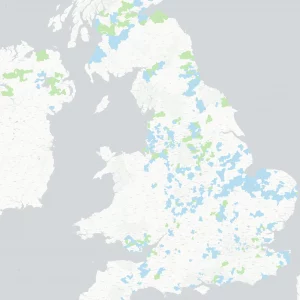Sponsored Links
ISP Limits Threaten Internet Video/Content Services
Posted: 02nd Aug, 2007 By: MarkJ
Comparison site Firsthelpline has warned that tight broadband download limits and poor connections could threaten the explosion in digital online content, not to mention cost consumers dearly in extra charges:
Easier said than done, although many operators (e.g. BT's 21CN) are already working on installing more modern infrastructure capable of handling the ever increasing bandwidth requirements.
However we disagree with the assertion that to watch online TV would require "a broadband connection of at least 8Mbps", that is simply not the case and varies from service to service, usually depending on compression quality and viewable resolution. Many are designed to run with on or over 2Mbps.
Likewise any attempt to standardise how much a particular service consumes in any given time frame (e.g. the above table/image) is invariably incorrect for similar reasons. For example, does Downloading HD Movies of 7GB represent 480i, 720p or 1080i/p standard etc? There are huge differences.
As illustrated in the table below, TV and movie downloads occupy a disproportionate amount of a users monthly limit. And with the TV industry pushing the advantages of high-definition viewing, Baloch believes movie buffs and other heavy consumers will struggle with restricted bandwidth and quickly exceed their download limits.

Web TV and streaming video means extra pressure is being put on Britains ageing telecoms infrastructure, which already lags behind much of Europe. Providers are doing little to help their customers, with many taking what Baloch believes to be unreasonable steps, by limiting services in a number of ways.
Customer drawbacks
Users exceeding their monthly limits are frequently charged for extra downloading and run the risk of having their service throttled, meaning their internet connection is slowed down to speeds similar to old style dial-up limits. In some cases supposed offenders have seen their service cut off altogether.
Currently anyone wishing to watch TV online needs a broadband connection of at least 8Mbps, but many of us are forced to make do with as little as 1Mbps, which Baloch says is nowhere near fast enough for a satisfactory digital entertainment experience.
On demand services must be curtailed unless infrastructure is radically improved. With the entertainment industry increasingly moving to an on-demand model firsthelpline.com is calling for suppliers to address weaknesses and give the people what they want higher speeds and download limits.

Web TV and streaming video means extra pressure is being put on Britains ageing telecoms infrastructure, which already lags behind much of Europe. Providers are doing little to help their customers, with many taking what Baloch believes to be unreasonable steps, by limiting services in a number of ways.
Customer drawbacks
Users exceeding their monthly limits are frequently charged for extra downloading and run the risk of having their service throttled, meaning their internet connection is slowed down to speeds similar to old style dial-up limits. In some cases supposed offenders have seen their service cut off altogether.
Currently anyone wishing to watch TV online needs a broadband connection of at least 8Mbps, but many of us are forced to make do with as little as 1Mbps, which Baloch says is nowhere near fast enough for a satisfactory digital entertainment experience.
On demand services must be curtailed unless infrastructure is radically improved. With the entertainment industry increasingly moving to an on-demand model firsthelpline.com is calling for suppliers to address weaknesses and give the people what they want higher speeds and download limits.
Easier said than done, although many operators (e.g. BT's 21CN) are already working on installing more modern infrastructure capable of handling the ever increasing bandwidth requirements.
However we disagree with the assertion that to watch online TV would require "a broadband connection of at least 8Mbps", that is simply not the case and varies from service to service, usually depending on compression quality and viewable resolution. Many are designed to run with on or over 2Mbps.
Likewise any attempt to standardise how much a particular service consumes in any given time frame (e.g. the above table/image) is invariably incorrect for similar reasons. For example, does Downloading HD Movies of 7GB represent 480i, 720p or 1080i/p standard etc? There are huge differences.
Search ISP News
Search ISP Listings
Search ISP Reviews
Latest UK ISP News








Cheap BIG ISPs for 100Mbps+
150,000+ Customers | View More ISPs
Cheapest ISPs for 100Mbps+
Modest Availability | View More ISPs
Latest UK ISP News
Helpful ISP Guides and Tips
Sponsored Links
The Top 15 Category Tags
- FTTP (5513)
- BT (3514)
- Politics (2535)
- Openreach (2297)
- Business (2261)
- Building Digital UK (2243)
- FTTC (2043)
- Mobile Broadband (1972)
- Statistics (1788)
- 4G (1663)
- Virgin Media (1619)
- Ofcom Regulation (1460)
- Fibre Optic (1394)
- Wireless Internet (1389)
- FTTH (1381)
Sponsored
Copyright © 1999 to Present - ISPreview.co.uk - All Rights Reserved - Terms , Privacy and Cookie Policy , Links , Website Rules

































